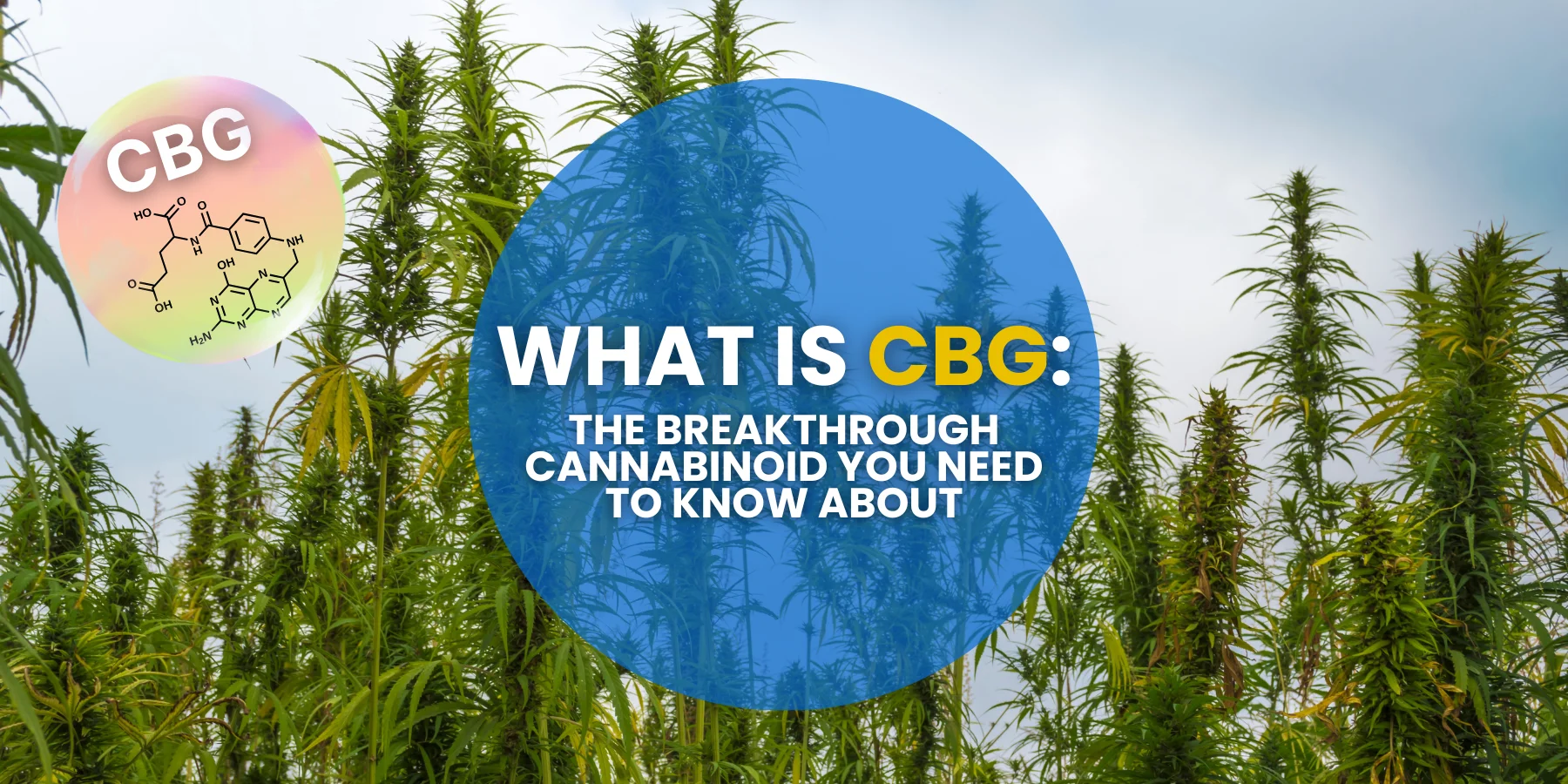What is CBG? But first let’s get to know the Cannabis plant.
Cannabis, a plant known for its medicinal and recreational uses, contains a wealth of compounds with potential health benefits. Among these compounds are cannabinoids, which have gained significant attention in recent years.
While THC and CBD have been the primary focus, another cannabinoid called CBG, or cannabigerol, is now emerging as an intriguing player in the world of natural health.
CBG stands out among the 100+ cannabinoids found in cannabis, and it is often referred to as the “mother cannabinoid.”
Unlike THC and CBD, CBG is primarily found in young cannabis plants, making it a unique and valuable component of the plant’s chemical profile. But what exactly is CBG, and what sets it apart from other cannabinoids?
What is CBG?

CBG, or Cannabigerol, is a special compound found in cannabis plants that has caught the attention of researchers. Unlike other cannabinoids, CBG is mostly found in young cannabis plants.
CBG and other cannabinoids interact with the endocannabinoid system to help oversee processes like mood, eating habits, discomfort, and immune function.
While THC is known for its mind-altering effects and CBD has become popular for its potential health benefits, CBG is now emerging as an exciting player in the world of natural health.
CBG is often called the “mother cannabinoid” because it serves as the building block for other cannabinoids like CBD and THC. It’s where it all begins.
Even though CBG has a similar weight and size to CBD, it has its own unique health properties that make it special. In the next sections, we’ll explore the distinct characteristics and potential benefits of Cannabigerol in simpler terms that everyone can understand.
What are the Effects of Cannabigerol?

CBG, or cannabigerol, is believed to provide potent effects without the psychoactive “high” typically associated with THC or other cannabinoids.
Unlike THC, CBG does not bind to the same neurological targets, which means it does not induce euphoria.
Instead, CBG is thought to work in a more subtle manner by targeting chronic stress and swelling within the body.
By reducing soreness, Cannabigerol may help alleviate symptoms associated with various conditions and promote overall well-being.
Its potential therapeutic properties make CBG an intriguing option for those seeking natural remedies without the intoxicating effects often associated with cannabis.
Does CBG Get You High?
CBG (Cannabigerol) does not induce the psychoactive “high” commonly associated with THC, the main intoxicating compound in cannabis. This is because CBG interacts with cannabinoid receptors differently. While THC binds strongly to CB1 receptors in the brain, which causes euphoria, CBG has a much weaker binding affinity and primarily targets CB2 receptors, which influence discomfort, swelling, and immune response. This non-intoxicating nature makes CBG an appealing option for users seeking therapeutic benefits without the mind-altering effects. Current research also highlights its potential in promoting relaxation, reducing stress, and addressing physical discomfort while keeping clarity and focus intact.
For those seeking non-intoxicating wellness options, CBG products like oils, capsules, and topicals offer an effective and natural solution.
How Does CBG Make You Feel?
CBG provides a balanced and uplifting experience. Its interaction with the body’s endocannabinoid system targets stress relief, minor aches, and soreness, leading to a soothing physical and mental effect. Unlike THC, it doesn’t induce a “high” or clouded cognition. Many users have noted its subtle boost in focus, motivation, and emotional stability, making it ideal for maintaining clarity throughout the day. This versatility makes CBG unique among cannabinoids for everyday wellness.
What Are the Benefits of CBG?

Improved Brain Health
- Cannabigerol may enhance learning abilities and memory formation by blocking a brain-based receptor involved in serotonin regulation.
- Cannabigerol’s antioxidant properties show promise in reducing brain cell damage and swelling, potentially benefiting neurodegenerative diseases.
Reduced Swelling
- Cannabigerol has demonstrated anti-swelling effects, particularly in the brain. Activation of PPAR receptors in the brain, facilitated by Cannabigerol , can promote the creation of new neurons in the hippocampus and improve the function of existing neurons.
- Cannabigerol’s ability to increase levels of BDNF, a protein that protects and repairs neuronal cells, contributes to its anti-swelling actions.
Enhanced Gut Health
- Cannabigerol’s antibacterial and anti-swelling properties make it potentially beneficial for improving gut health. It may combat harmful bacteria associated with intestinal swelling.
- Cannabigerol has also shown efficacy against antibiotic-resistant strains of bacteria, such as methicillin-resistant Staphylococcus aureus (MRSA).
- Historical use of Cannabigerol in ancient cultures for combating parasites further supports its potential for gut health.
Will CBG show up on a drug test?
Cannabigerol (CBG), a non-intoxicating cannabinoid, is unlikely to trigger a positive result on most standard drug tests. However, drug screenings typically test for THC—the psychoactive compound in cannabis—and not directly for CBG. That said, cross-contamination in some full-spectrum products containing trace amounts of THC may pose a risk. If you’re using high-quality, lab-tested pure CBG isolate products free of THC, the likelihood of failing a drug test is minimal.
Effects of CBG When Combined With Other Cannabinoids
When analyzing CBG vs CBN, both cannabinoids contribute uniquely to the entourage effect, where CBG plays a critical role in enhancing therapeutic results. For instance, CBG can moderate the intensity of THC’s psychoactive effects while boosting CBD’s anti-stress and anti-swelling benefits. Researchers have observed promising outcomes in conditions such as glaucoma, stress, neurodegenerative diseases, and multi-drug resistant infections when different cannabinoids, including CBG, are administered together. This interplay offers an exciting opportunity to maximize health benefits in cannabis-based treatments.
What is the difference between CBD and CBG?

When exploring CBG vs CBD, both cannabinoids are derived from hemp plants, are non-psychoactive, and offer unique health benefits.
Both CBG and CBD have properties that help reduce swelling and fight bacteria, with CBG being utilized by some to relieve symptoms related to stomach issues.
In terms of specific characteristics, CBG exhibits stronger antibacterial effects compared to CBD, making it particularly promising for use in creams or topical applications.
Research has highlighted Cannabigerol’s efficacy in combating pathogenic bacteria. On the other hand, CBD tends to have sedating effects at higher doses and is commonly used as a sleep aid.
The complementary benefits of Cannabigerol and CBD make them an ideal health duo, offering a range of potential advantages to improve overall well-being.
What is the difference between CBGA and CBG?

When comparing CBGA vs CBG, both cannabinoids offer unique benefits, such as anti-swelling properties, but they differ significantly in terms of specific applications and effects on the body.
CBGa, or cannabigerolic acid, is the precursor to CBG.
It has a distinct chemical structure that has caught the attention of researchers.
On the other hand, CBG, or cannabigerol, is a non-intoxicating cannabinoid that is derived from CBGa.
It possesses its own range of potential health applications, including easing soreness, supporting neural health, offering relief, and fighting bacterial infections. CBG, like CBGa, appears to have minimal side effects.
Stirling’s Energy Gummies and Immunity Gummies have CBGA that enhances its therapeautic effects along with other cannabinoids such as CBD and CBDA.
Although CBGa and CBG have some overlap, they are chemically distinct and may have different effects on the body. Further research is necessary to explore their unique properties and potential benefits fully.
Takeaway
Cannabigerol, is a fascinating cannabinoid found in cannabis plants.
While THC and CBD have traditionally garnered the most attention, CBG is now emerging as a promising compound in the world of natural health.
As the “mother cannabinoid,” Cannabigerol serves as a precursor to other cannabinoids, making it an essential component of the cannabis plant’s chemical profile.
Cannabigerol has shown potential benefits for brain health, including enhancing learning abilities and memory formation, as well as reducing brain cell damage and soreness.
Its anti-swelling properties extend beyond the brain and may positively impact gut health by combating harmful bacteria and reducing intestinal swelling. Products like CBD Energy Gummies combine these benefits, promoting relaxation and overall well-being.
When comparing CBG to CBD, they differ in their receptor interactions and specific characteristics.
CBG exhibits more potent antibacterial effects, making it suitable for topical applications, while CBD tends to have sedating effects and is commonly used for sleep aid.


